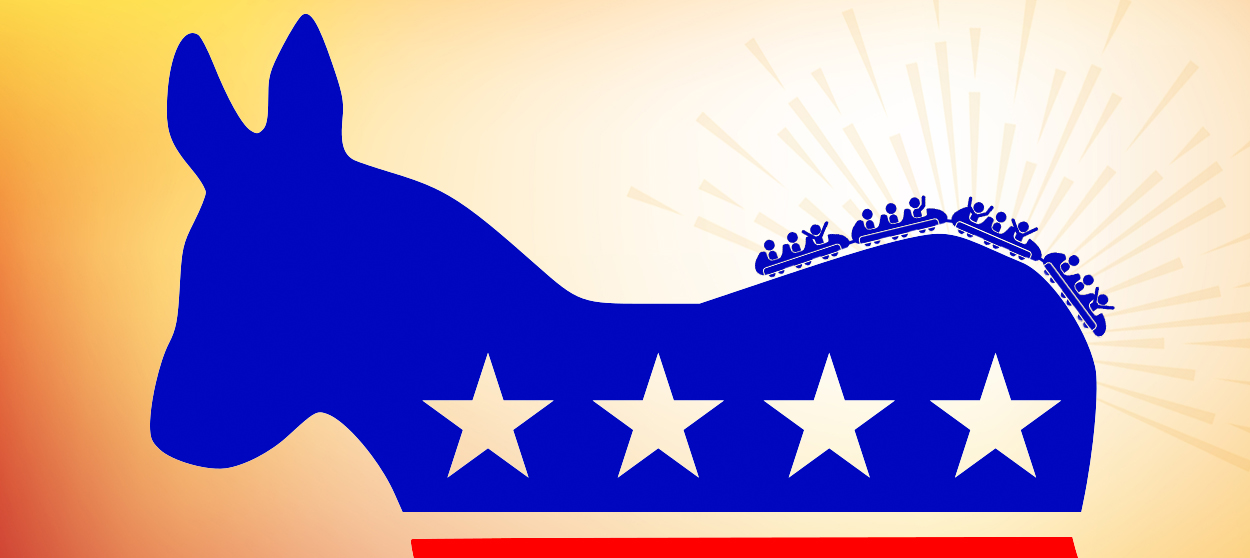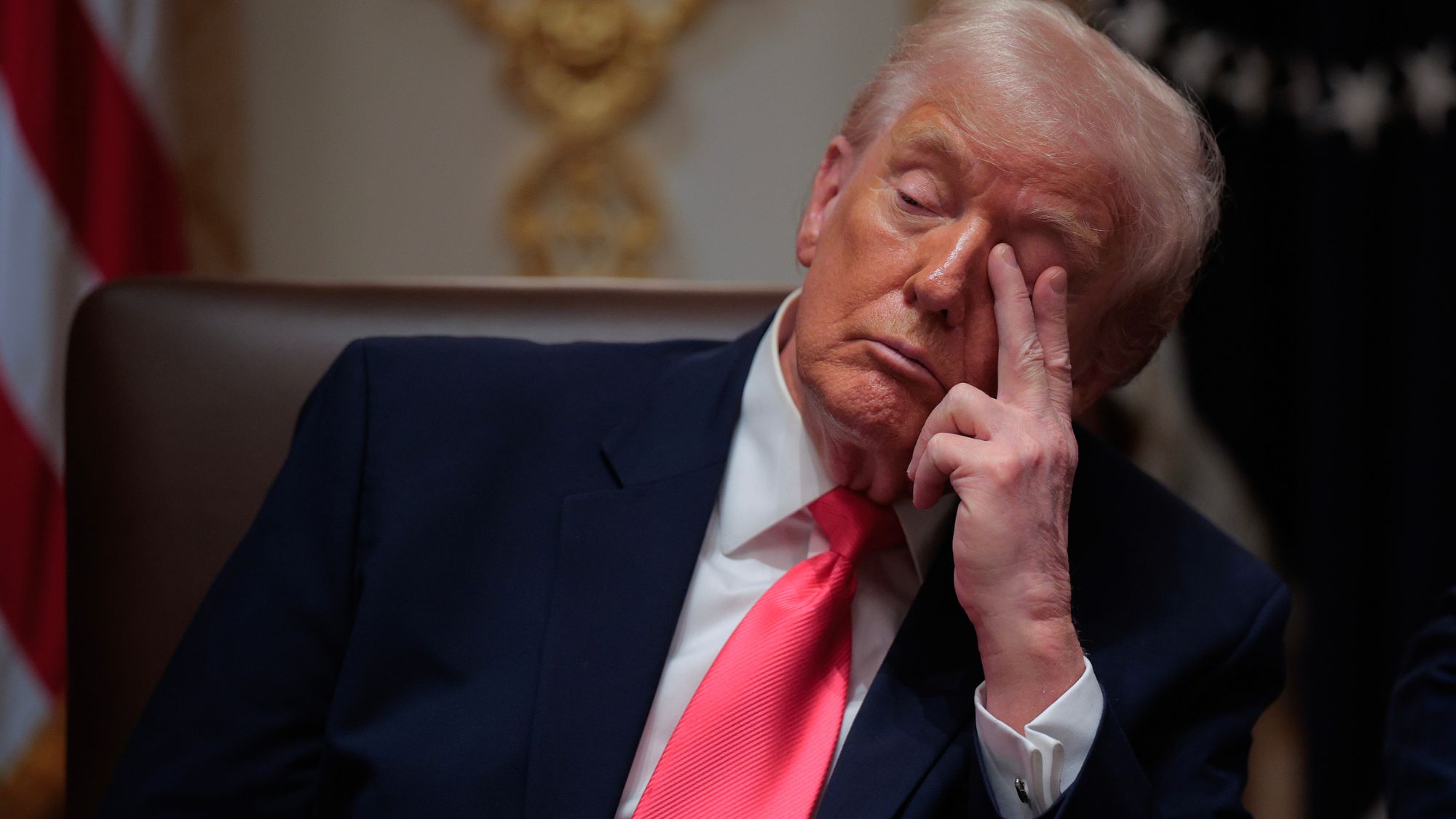How to explain 2020 Democrats' churning polls
The party's political junkies are nervous


A free daily email with the biggest news stories of the day – and the best features from TheWeek.com
You are now subscribed
Your newsletter sign-up was successful
Is the Democratic race for president a farcical clown car of candidates? Or do Democrats simply have a remarkable bounty of capable alternatives from which to choose, and plenty of time to sift through them? The answer is "both." There is both stability and ferment, confidence and anxiety, depending on where you look. Much of the drama of the campaign so far may in fact reflect the manic indecision of certain voters more than it does anything real on the ground. And its the voters who are most plugged in who may be the most anxious and indecisive.
At the top of the polls, the race for the Democratic nomination has been quite stable over a long period of time. The leading candidates are Vice President Joe Biden — who is expected to officially announce he's running on Thursday — and Sen. Bernie Sanders. Nate Silver's FiveThirtyEight has collected 68 national polls so far, and Biden and Sanders have taken the top two slots in all but three of those where both candidates are mentioned. The story is similar in polls of Iowa and New Hampshire.
These polls can readily be discounted as being more reflective of name recognition than anything else. The fact that the second choice for Biden voters is Sanders and vice versa confirms that many of these voters are not choosing based on ideology. But it's not just that these candidates names are known. They themselves are known — Biden for his eight years' service as vice president, and Sanders for his surprisingly powerful insurgent campaign in 2016. These voters may not be paying close attention to the rest of the candidates yet, but that's because the campaign has barely begun. They haven't seen a reason, yet, to go shopping beyond brands they have already come to trust. That kind of loyalty is normally considered a positive, in politics as in other fields of life.
The Week
Escape your echo chamber. Get the facts behind the news, plus analysis from multiple perspectives.

Sign up for The Week's Free Newsletters
From our morning news briefing to a weekly Good News Newsletter, get the best of The Week delivered directly to your inbox.
From our morning news briefing to a weekly Good News Newsletter, get the best of The Week delivered directly to your inbox.
What about the folks on the inside, Democratic activists who will actually make a difference to any given campaign's success on the ground? How do they see the race? The folks at FiveThirtyEight have been tracking them as well, if less scientifically, polling activists in the early voting states and in D.C., asking who they'd consider supporting — and who they don't want to see win.
The results are interesting if unsurprising. Candidates with strong credentials inside the party like Sens. Kamala Harris, Corey Booker and Elizabeth Warren lead the field, with Sanders and Biden somewhere in the middle of the pack and long-shots like Jay Inslee and Andrew Yang bringing up the rear. Meanwhile, after the idiosyncratic Rep. Tulsi Gabbard, the candidates who most activists would refuse to support (in the primary, not the general election) are ... Sanders and Biden. This no doubt reflects both their positioning at opposite ends of the Democratic Party's institutional and ideological divide and, potentially, the fact that they are both older white gentlemen.
So where is the volatility and drama coming from? Well, if you look below Biden and Sanders in the polls, you'll see quite a bit of ferment, candidates surging to prominence and then falling back into relative obscurity to be replaced by a new face, a new flavor. It happened to Harris, who after her announcement vaulted into the high teens in Iowa and the mid-teens in New Hampshire, but who has since dropped to the mid single digits. It happened to Beto O'Rourke, who polled in the high-teens in some polls back in December before he ever announced and is now mired in the single digits and dropping. And now it's happening to "Mayor Pete" Buttigieg, who has suddenly vaulted into the top tier with polls of Iowa, New Hampshire, and the nation at large placing him a close third behind Biden and Sanders, with support in the mid- to high teens.
What does Buttigieg's meteoric rise mean? His personal appeal and native political talents are clear — but so were those of Harris and O'Rourke. He's done a fabulous job of playing the media's game — but Harris had what was widely regarded as a flawless campaign roll-out and O'Rourke was a genuine social media phenomenon. Buttigieg seems to be doing an excellent job of appealing to both progressives and moderates — but Harris and O'Rourke were touted for having similar crossover appeal. Buttigieg doesn't represent a particular factional or ideological perspective that was underrepresented before his entry into the race, nor has he distinguished himself with some defining moment or action that crystallizes the case for his candidacy.
A free daily email with the biggest news stories of the day – and the best features from TheWeek.com
Pete Buttigieg is a very promising rising star. But his ability to eclipse, at least momentarily, objectively bigger objects in the political firmament says something about what a significant number of supposedly high-information voters are looking for — and it doesn't speak flatteringly. What they are looking for is a star, someone they can admire and bask in the glow of supporting — and who they believe will make lots of other people feel that way, who has "breakout potential." They are thinking like consumers and marketers of novel brands and entertainment properties, and their fickleness and mania are entirely typical in that industry. They do not appear to be thinking like people choosing a leader of a country.
This is, of course, not an exclusively Democratic phenomenon, nor an exclusively American one. We live, after all, in a world where a comedian who played Ukraine's president on television can be elected by a landslide to the actual presidency without ever being particularly clear on how he would address any of his country's massive problems. And while being mayor of South Bend isn't much preparation for being president, neither is being a reality television star, or a first term senator, or governor of a state with an exceptionally weak governor. If the United States can survive the current president, it will surely do well enough under a polyglot president Pete.
But it's a problem for democratic accountability when the elected leader, who nominally possesses vast power and cannot be removed except for high crimes and misdemeanors, is chosen primarily for his ability to inspire intense and sometimes fleeting feelings of identification, leaving it to unelected subordinates to decide the actual direction of the country. If that is what we want, perhaps we need a different system — a head of government elected by a parliament that can remove her at any time, and a head of state who inspires intense loyalty and wields great symbolic power, but whose interference with practical politics would be viewed with constitutional alarm.
Then again, maybe not. After all, these days things don't seem to be working any better on the other side of the pond.
Noah Millman is a screenwriter and filmmaker, a political columnist and a critic. From 2012 through 2017 he was a senior editor and featured blogger at The American Conservative. His work has also appeared in The New York Times Book Review, Politico, USA Today, The New Republic, The Weekly Standard, Foreign Policy, Modern Age, First Things, and the Jewish Review of Books, among other publications. Noah lives in Brooklyn with his wife and son.
-
 How the FCC’s ‘equal time’ rule works
How the FCC’s ‘equal time’ rule worksIn the Spotlight The law is at the heart of the Colbert-CBS conflict
-
 What is the endgame in the DHS shutdown?
What is the endgame in the DHS shutdown?Today’s Big Question Democrats want to rein in ICE’s immigration crackdown
-
 ‘Poor time management isn’t just an inconvenience’
‘Poor time management isn’t just an inconvenience’Instant Opinion Opinion, comment and editorials of the day
-
 The billionaires’ wealth tax: a catastrophe for California?
The billionaires’ wealth tax: a catastrophe for California?Talking Point Peter Thiel and Larry Page preparing to change state residency
-
 Bari Weiss’ ‘60 Minutes’ scandal is about more than one report
Bari Weiss’ ‘60 Minutes’ scandal is about more than one reportIN THE SPOTLIGHT By blocking an approved segment on a controversial prison holding US deportees in El Salvador, the editor-in-chief of CBS News has become the main story
-
 Trump’s poll collapse: can he stop the slide?
Trump’s poll collapse: can he stop the slide?Talking Point President who promised to ease cost-of-living has found that US economic woes can’t be solved ‘via executive fiat’
-
 Has Zohran Mamdani shown the Democrats how to win again?
Has Zohran Mamdani shown the Democrats how to win again?Today’s Big Question New York City mayoral election touted as victory for left-wing populists but moderate centrist wins elsewhere present more complex path for Democratic Party
-
 Millions turn out for anti-Trump ‘No Kings’ rallies
Millions turn out for anti-Trump ‘No Kings’ ralliesSpeed Read An estimated 7 million people participated, 2 million more than at the first ‘No Kings’ protest in June
-
 Ghislaine Maxwell: angling for a Trump pardon
Ghislaine Maxwell: angling for a Trump pardonTalking Point Convicted sex trafficker's testimony could shed new light on president's links to Jeffrey Epstein
-
 The last words and final moments of 40 presidents
The last words and final moments of 40 presidentsThe Explainer Some are eloquent quotes worthy of the holders of the highest office in the nation, and others... aren't
-
 The JFK files: the truth at last?
The JFK files: the truth at last?In The Spotlight More than 64,000 previously classified documents relating the 1963 assassination of John F. Kennedy have been released by the Trump administration
